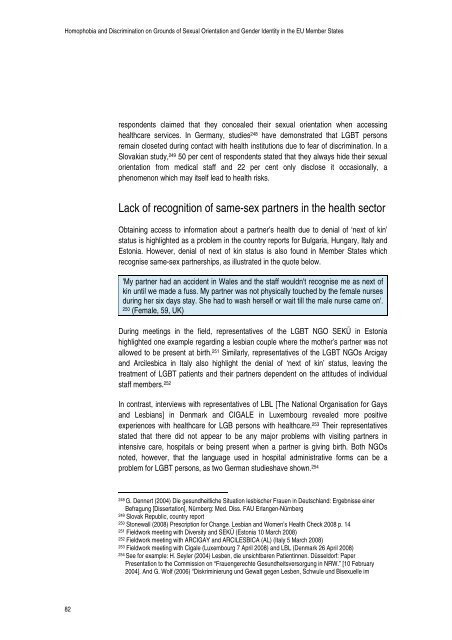Homophobia and Discrimination on
Homophobia and Discrimination on
Homophobia and Discrimination on
You also want an ePaper? Increase the reach of your titles
YUMPU automatically turns print PDFs into web optimized ePapers that Google loves.
<str<strong>on</strong>g>Homophobia</str<strong>on</strong>g> <str<strong>on</strong>g>and</str<strong>on</strong>g> <str<strong>on</strong>g>Discriminati<strong>on</strong></str<strong>on</strong>g> <strong>on</strong> Grounds of Sexual Orientati<strong>on</strong> <str<strong>on</strong>g>and</str<strong>on</strong>g> Gender Identity in the EU Member States<br />
82<br />
resp<strong>on</strong>dents claimed that they c<strong>on</strong>cealed their sexual orientati<strong>on</strong> when accessing<br />
healthcare services. In Germany, studies 248 have dem<strong>on</strong>strated that LGBT pers<strong>on</strong>s<br />
remain closeted during c<strong>on</strong>tact with health instituti<strong>on</strong>s due to fear of discriminati<strong>on</strong>. In a<br />
Slovakian study, 249 50 per cent of resp<strong>on</strong>dents stated that they always hide their sexual<br />
orientati<strong>on</strong> from medical staff <str<strong>on</strong>g>and</str<strong>on</strong>g> 22 per cent <strong>on</strong>ly disclose it occasi<strong>on</strong>ally, a<br />
phenomen<strong>on</strong> which may itself lead to health risks.<br />
Lack of recogniti<strong>on</strong> of same-sex partners in the health sector<br />
Obtaining access to informati<strong>on</strong> about a partner’s health due to denial of ‘next of kin’<br />
status is highlighted as a problem in the country reports for Bulgaria, Hungary, Italy <str<strong>on</strong>g>and</str<strong>on</strong>g><br />
Est<strong>on</strong>ia. However, denial of next of kin status is also found in Member States which<br />
recognise same-sex partnerships, as illustrated in the quote below.<br />
'My partner had an accident in Wales <str<strong>on</strong>g>and</str<strong>on</strong>g> the staff wouldn't recognise me as next of<br />
kin until we made a fuss. My partner was not physically touched by the female nurses<br />
during her six days stay. She had to wash herself or wait till the male nurse came <strong>on</strong>'.<br />
250 (Female, 59, UK)<br />
During meetings in the field, representatives of the LGBT NGO SEKÜ in Est<strong>on</strong>ia<br />
highlighted <strong>on</strong>e example regarding a lesbian couple where the mother’s partner was not<br />
allowed to be present at birth. 251 Similarly, representatives of the LGBT NGOs Arcigay<br />
<str<strong>on</strong>g>and</str<strong>on</strong>g> Arcilesbica in Italy also highlight the denial of ‘next of kin’ status, leaving the<br />
treatment of LGBT patients <str<strong>on</strong>g>and</str<strong>on</strong>g> their partners dependent <strong>on</strong> the attitudes of individual<br />
staff members. 252<br />
In c<strong>on</strong>trast, interviews with representatives of LBL [The Nati<strong>on</strong>al Organisati<strong>on</strong> for Gays<br />
<str<strong>on</strong>g>and</str<strong>on</strong>g> Lesbians] in Denmark <str<strong>on</strong>g>and</str<strong>on</strong>g> CIGALE in Luxembourg revealed more positive<br />
experiences with healthcare for LGB pers<strong>on</strong>s with healthcare. 253 Their representatives<br />
stated that there did not appear to be any major problems with visiting partners in<br />
intensive care, hospitals or being present when a partner is giving birth. Both NGOs<br />
noted, however, that the language used in hospital administrative forms can be a<br />
problem for LGBT pers<strong>on</strong>s, as two German studieshave shown. 254<br />
248 G. Dennert (2004) Die gesundheitliche Situati<strong>on</strong> lesbischer Frauen in Deutschl<str<strong>on</strong>g>and</str<strong>on</strong>g>: Ergebnisse einer<br />
Befragung [Dissertati<strong>on</strong>], Nürnberg: Med. Diss. FAU Erlangen-Nürnberg<br />
249 Slovak Republic, country report<br />
250 St<strong>on</strong>ewall (2008) Prescripti<strong>on</strong> for Change. Lesbian <str<strong>on</strong>g>and</str<strong>on</strong>g> Women’s Health Check 2008 p. 14<br />
251 Fieldwork meeting with Diversity <str<strong>on</strong>g>and</str<strong>on</strong>g> SEKÜ (Est<strong>on</strong>ia 10 March 2008)<br />
252 Fieldwork meeting with ARCIGAY <str<strong>on</strong>g>and</str<strong>on</strong>g> ARCILESBICA (AL) (Italy 5 March 2008)<br />
253 Fieldwork meeting with Cigale (Luxembourg 7 April 2008) <str<strong>on</strong>g>and</str<strong>on</strong>g> LBL (Denmark 26 April 2008)<br />
254 See for example: H. Seyler (2004) Lesben, die unsichtbaren Patientinnen. Düsseldorf: Paper<br />
Presentati<strong>on</strong> to the Commissi<strong>on</strong> <strong>on</strong> “Frauengerechte Gesundheitsversorgung in NRW.” [10 February<br />
2004]. And G. Wolf (2006) "Diskriminierung und Gewalt gegen Lesben, Schwule und Bisexuelle im

















